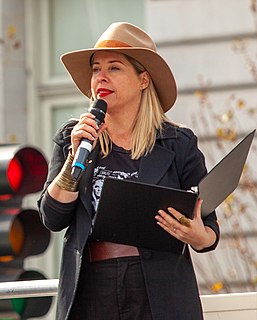A Quote by Robert Neelly Bellah
"Nothing is ever lost" means that what we are now goes all the way back through natural history. We are biological organisms and not simply computerized brains. By focusing totally on the present, thinking only about science and computers, and forgetting four billion years of life on this planet, we are losing perspective on who and what we are.
Related Quotes
Our planet has been around only for four and a half billion years. Let's imagine a planet that has life on it such as life is on Earth and it's seven billion years old. Let's say that planet evolved intelligence. Well, that intelligence would be way more advanced than what we call intelligence here on Earth. How long has intelligence been around on Earth as we've come to define it?
One dictionary that I consulted remarks that "natural history" now commonly means the study of animals and plants "in a popular and superficial way," meaning popular and superficial to be equally damning adjectives. This is related to the current tendency in the biological sciences to label every subdivision of science with a name derived from the Greek. "Ecology" is erudite and profound; while "natural history" is popular and superficial. Though, as far as I can see, both labels apply to just about the same package of goods.
Early in my career I discovered that there was something really special about photographing at night that places your mind on the surface of the planet. You’re no longer just a human being walking around in the regular world. You’re a human animal striding around on the surface of the planet that’s out in the middle of the galaxy. We as a culture, we’re forgetting that we are actually natural organisms and that we have this very deep connection and contact with nature. You can’t divorce civilization from nature. We totally depend on it.
Truth is always here. That's the only way truth can be. Truth cannot be anywhere else. The only time it can be is here, and the only place it can be is now. But the mind is never here and is never now. Hence, mind and truth never meet. The mind goes on thinking about truth, and the truth goes on waiting to be realized, but the meeting never happens. The meeting is possible only if mind stops functioning, because mind means the past, mind means the future. Mind is never here-now. Whenever you start thinking, you are going astray. If you stop thinking, suddenly you are at home.
There is nothing wrong with the planet. The planet is fine ... been here 4 1/2 billion years. We've been here, what, a 100,000 years, maybe 200,000. And we've only been engaged in heavy industry a little over 200 years. 200 years versus 4 1/2 billion. And we have the conceit to think that somehow we're a threat? The planet isn't going away. We are.
If we could magically transport ourselves back to the young Earth, when it was only a billion years old or two billion years old or three billion years old or four billion years old, we wouldn't be able to survive. We would have a hard time surviving if we were transported to the time when dinosaurs were around.
Thirty years ago, if you said the country was living beyond its means, people would have thought about economics. Now, if you talk about the country, or the planet living beyond its means, you think about the environment. We are taking out more than we are giving back. We are consuming energy, water, and other natural resources in a way that is leading to huge and often irreversible damage to the planet. So too are most other developed nations. And so too will China and India if they follow the same path of economic development as us
Of the four billion life forms which have existed on this planet, three billion, nine hundred and sixty million are now extinct. We don't know why. Some by wanton extinction, some through natural catastrophe, some destroyed by meteorites and asteroids. In the light of these mass extinctions it really does seem unreasonable to suppose that Homo sapiens should be exempt. Our species will have been one of the shortest-lived of all, a mere blink, you may say, in the eye of time.
We can speak of politics, ethics, and in this way, speak about the world. But at the same time, it's always in a way that is totally nebulous and abstracted, this way of thinking about reality. And that's why I write the way I do - it's an almost immortal way to show dependence on the biological, the political, the moral parts of us. I say immortal because we now have to find new formats, new eloquences, and resolve within ourselves this "constructed" life, a life that is incomplete, imperfect.
We are headed to a radically new Earth, at least from our perspective. But from the planet's perspective, this is nothing new. As the geologist Peter Ward is fond of pointing out, we are actually heading back to a time kind of like the Miocene. The Miocene ended about 5.5 million years ago, and it was the last time that the planet had no icecaps.





































